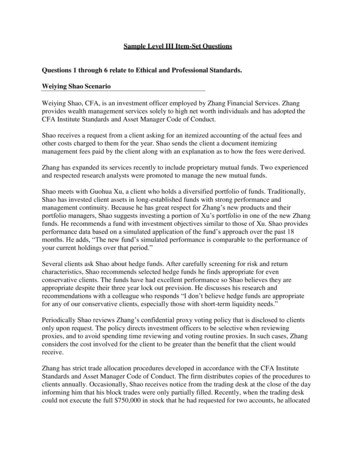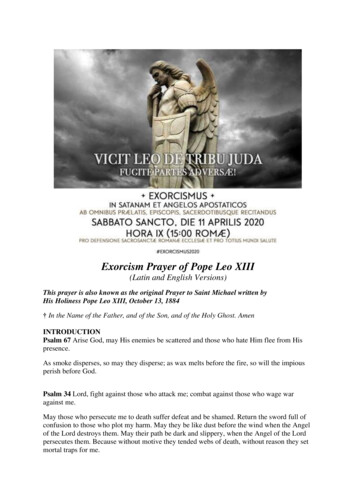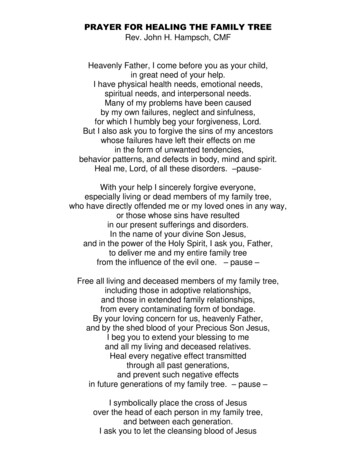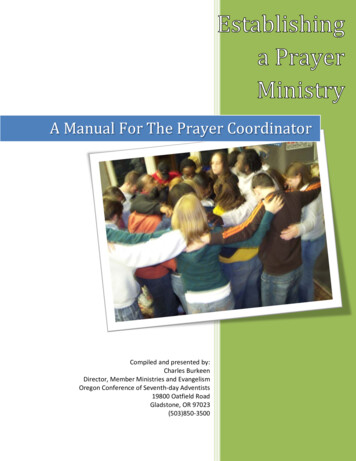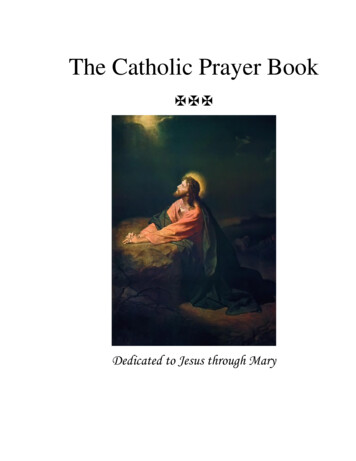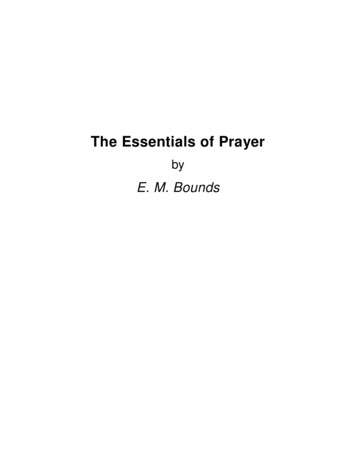
Transcription
The Essentials of PrayerbyE. M. Bounds
The Essentials of PrayerE. M. BoundsTHE ESSENTIALS OF PRAYERFOREWORDThe work of editing the Bounds Spiritual Life Books has been a labour of love which has brought greatprofit and blessing to my own soul. After years of close study of the literary remains of this greatChristian, together with the work of other mystics, I am fully persuaded that to but few of the sons ofmen has there been given such spiritual power as was vouchsafed to Edward McKendree Bounds.Truly he was a burning and a shining light, and as The Sunday School Times says, he was aspecialist in prayer and his books are for the quiet hour, for careful meditation and for all who wish toseek and find the treasures of God.It was my great privilege to know the author well, and also to know that his intention, ineverything he wrote, was for the salvation of his readers. The Essentials of Prayer is sent forth in thisspirit. May God bless it to many hearts and use it for the upbuilding and strengthening of Christiancharacter through the length and breadth of the land.Homer W. HodgeFlushing, N.Y.2
The Essentials of PrayerE. M. BoundsI. PRAYER TAKES IN THE WHOLE MANHenry Clay Trumbull spoke forth the Infinite in the terms of our world, and the Eternalin the forms of our human life. Some years ago, on a ferry-boat, I met a gentleman who knewhim, and I told him that when I had last seen Dr. Trumbull, a fortnight before, he had spokenof him. Oh, yes, said my friend, he was a great Christian, so real, so intense. He was at myhome years ago and we were talking about prayer. Why, Trumbull, I said, you don t meanto say if you lost a pencil you would pray about it, and ask God to help you find it Of courseI would; of course I would, was his instant and excited reply. Of course he would. Was nothis faith a real thing? Like the Saviour, he put his doctrine strongly by taking an extremeillustration to embody his principle, but the principle was fundamental. He did trust God ineverything. And the Father honoured the trust of His child.Robert E. SpeerPrayer has to do with the entire man. Prayer takes in man in his whole being, mind, soul and body. Ittakes the whole man to pray, and prayer affects the entire man in its gracious results. As the wholenature of man enters into prayer, so also all that belongs to man is the beneficiary of prayer. All ofman receives benefits in prayer. The whole man must be given to God in praying. The largest resultsin praying come to him who gives himself, all of himself, all that belongs to himself, to God. This isthe secret of full consecration, and this is a condition of successful praying, and the sort of prayingwhich brings the largest fruits.The men of olden times who wrought well in prayer, who brought the largest things to pass, whomoved God to do great things, were those who were entirely given over to God in their praying. Godwants, and must have, all that there is in man in answering his prayers. He must have whole-heartedmen through whom to work out His purposes and plans concerning men. God must have men in theirentirety. No double-minded man need apply. No vacillating man can be used. No man with a dividedallegiance to God, and the world and self, can do the praying that is needed.Holiness is wholeness, and so God wants holy men, men whole-hearted and true, for His service andfor the work of praying. And the very God of peace sanctify you wholly; and I pray God your wholespirit and soul and body be preserved blameless unto the coming of our Lord Jesus Christ These arethe sort of men God wants for leaders of the hosts of Israel, and these are the kind out of which thepraying class is formed.Man is a trinity in one, and yet man is neither a trinity nor a dual creature when he prays, but aunit. Man is one in all the essentials and acts and attitudes of piety. Soul, spirit and body are to unite inall things pertaining to life and godliness.The body, first of all, engages in prayer, since it assumes the praying attitude in prayer.Prostration of the body becomes us in praying as well as prostration of the soul. The attitude of thebody counts much in prayer, although it is true that the heart may be haughty and lifted up, and themind listless and wandering, and the praying a mere form, even while the knees are bent in prayer.Daniel kneeled upon his knees three times a day in prayer. Solomon kneeled in prayer at thededication of the temple. Our Lord in Gethsemane prostrated Himself in that memorable season ofpraying just before His betrayal. Where there is earnest and faithful praying the body always takes3
The Essentials of PrayerE. M. Boundson the form most suited to the state of the soul at the time. The body, that far, joins the soul inpraying.The entire man must pray. The whole man, life, heart, temper, mind, are in it. Each and all join inthe prayer exercise. Doubt, double-mindedness, division of the affections, are all foreign to the closetcharacter and conduct, undefiled, made whiter than snow, are mighty potencies, and are the mostseemly beauties for the closet hour, and for the struggles of prayer.A loyal intellect must conspire and add the energy and fire of its undoubting and undivided faithto that kind of all hour, the hour of prayer. Necessarily the mind enters into the praying. First of all, ittakes thought to pray. The intellect teaches us we ought to pray. By serious thinking beforehand themind prepares itself for approaching a throne of grace. Thought goes before entrance into the closetand prepares the way for true praying. It considers what will be asked for in the closet hour. Truepraying does not leave to the inspiration of the hour what will be the requests of that hour. As prayingis asking for something definite of God, so, beforehand, the thought arises What shall I ask for atthis hour? All vain and evil and frivolous thoughts are eliminated, and the mind is given over entirelyto God, thinking of Him, of what is needed, and what has been received in the past. By every token,prayer, in taking hold of the entire man, does not leave out the mind. The very first step in prayer is amental one. The disciples took that first step when they said unto Jesus at one time, Lord, teach us topray. We must be taught through the intellect, and just in so far as the intellect is given up to God inprayer, will we be able to learn well and readily the lesson of prayer.Paul spreads the nature of prayer over the whole man. It must be so. It takes the whole man toembrace in its god-like sympathies the entire race of man the sorrows, the sins and the death ofAdam s fallen race. It takes the whole man to run parallel with God s high and sublime will in savingmankind. It takes the whole man to stand with our Lord Jesus Christ as the one Mediator betweenGod and sinful man. This is the doctrine Paul teaches in his prayer-directory in the second chapter ofhis first Epistle to Timothy.Nowhere does it appear so clearly that it requires the entire man in all departments of his being, topray than in this teaching of Paul. It takes the whole man to pray till all the storms which agitate hissoul are calmed to a great calm, till the stormy winds and waves cease as by a Godlike spell. It takes thewhole man to pray till cruel tyrants and unjust rulers are changed in their natures and lives, as well asin their governing qualities, or till they cease to rule. It requires the entire man in praying till high andproud and unspiritual ecclesiastics become gentle, lowly and religious, till godliness and gravity bearrule in Church and in State, in home and in business, in public as well as in private life.It is man s business to pray; and it takes manly men to do it. It is godly business to pray and ittakes godly men to do it. And it is godly men who give over themselves entirely to prayer. Prayer is farreaching in its influence and in its gracious effects. It is intense and profound business which dealswith God and His plans and purposes, and it takes whole-hearted men to do it. No half-hearted, halfbrained, half-spirited effort will do for this serious, all-important, heavenly business. The whole heart,the whole brain, the whole spirit, must be in the matter of praying, which is so mightily to affect thecharacters and destinies of men.The answer of Jesus to the scribe as to what was the first and greatest commandment was as follows:“The Lord our God is one Lord; And thou shalt love the Lord thy God with all thy heart,and with thy soul, and with all thy mind, and with all thy strength.In one word, the entire man without reservation must love God. So it takes the same entire man todo the praying which God requires of men. All the powers of man must be engaged in it. God cannottolerate a divided heart in the love He requires of men, neither can He bear with a divided man inpraying.4
The Essentials of PrayerE. M. BoundsIn the one hundred and nineteenth Psalm the Psalmist teaches this very truth in these words:Blessed are they that keep his testimonies, and that seek him with the whole heart.It takes whole-hearted men to keep God s commandments and it demands the same sort of men toseek God. These are they who are counted blessed. Upon these whole-hearted ones God s approvalrests.Bringing the case closer home to himself the Psalmist makes this declaration as to his practice:With my whole heart have I sought thee; O let me not wander from thy commandments.And further on, giving us his prayer for a wise and understanding heart, he tells us his purposesconcerning the keeping of God s law:Give me understanding and I shall keep thy law; Yea, I shall observe it with my wholeheart.Just as it requires a whole heart given to God to gladly and fully obey God s commandments, soit takes a whole heart to do effectual praying.Because it requires the whole man to pray, praying is no easy task. Praying is far more thansimply bending the knee and saying a few words by rote.Tis not enough to bend the knee,And words of prayer to say;The heart must with the lips agree,Or else we do not pray.Praying is no light and trifling exercise. While children should be taught early to pray, praying isno child s task. Prayer draws upon the whole nature of man. Prayer engages all the powers of man smoral and spiritual nature. It is this which explains somewhat the praying of our Lord described as inHebrews 5:7:Who in the days of his flesh, when he had offered up prayers and supplications, with strongcrying and tears, unto him that was able to save him from death, and was heard in that hefeared.It takes only a moment s thought to see how such praying of our Lord drew mightily upon all thepowers of His being, and called into exercise every part of His nature. This is the praying which bringsthe soul close to God and which brings God down to earth.Body, soul and spirit are taxed and brought under tribute to prayer. David Brainerd makes thisrecord of his praying:God enabled me to agonise in prayer till I was wet with perspiration, though in the shade and in acool place.The Son of God in Gethsemane was in an agony of prayer, which engaged His whole being:And when he was at the place, he said unto them, Pray ye that ye enter not into temptation.And he was withdrawn from them about a stone s cast, and kneeled down and prayed, saying,Father, if thou be willing, remove this cup from me; nevertheless, not my will, but thine, be done.And there appeared an angel unto him, from heaven, strengthening him. And being in anagony, he prayed more earnestly: and his sweat was as it were great drops of blood fallingdown to the ground. Luke 22:40-44.Here was praying which laid its hands on every part of our Lord s nature, which called forth allthe powers of his soul, His mind and His body. This was praying which took in the entire man.Paul was acquainted with this kind of praying. In writing to the Roman Christians, he urges themto pray with him after this fashion:Now I beseech you, brethren, for the Lord Jesus Christ s sake, and for the love of theSpirit, that ye strive together with me in your prayers to God for me.5
The words, strive together with me, tells of Paul s praying, and how much he put into it. It isnot a docile request, not a little thing, this sort of praying, this striving with me. It is of the nature ofa great battle, a conflict to win, a great battle to be fought. The praying Christian, as the soldier, fightsa life-and-death struggle. His honour, his immortality, and eternal life are all in it. This is praying asthe athlete struggles for the mastery, and for the crown, and as he wrestles or runs a race. Everythingdepends on the strength he puts in it. Energy, ardour, swiftness, every power of his nature is in it.Every power is quickened and strained to its very utmost. Littleness, half-heartedness, weakness andlaziness are all absent.Just as it takes the whole man to pray successfully, so in turn the whole man receives the benefitsof such praying. As every part of man s complex being enters into true praying, so every part of thatsame nature receives blessings from God in answer to such praying. This kind of praying engages ourundivided hearts, our full consent to be the Lord s, our whole desires.God sees to it that when the whole man prays, in turn the whole man shall be blessed. His bodytakes in the good of praying, for much praying is done specifically for the body. Food and raiment,health and bodily vigour, come in answer to praying. Clear mental action, right thinking, anenlightened understanding, and safe reasoning powers, come from praying. Divine guidance meansGod so moving and impressing the mind, that we shall make wise and safe decisions. The meek willhe guide in judgment.Many a praying preacher has been greatly helped just at this point. The unction of the Holy Onewhich comes upon the preacher invigorates the mind, loosens up thought and gives utterance. This isthe explanation of former days when men of very limited education had such wonderful liberty of theSpirit in praying and in preaching. Their thoughts flowed as a stream of water. Their entire intellectualmachinery felt the impulse of the Divine Spirit s gracious influences.And, of course, the soul receives large benefits in this sort of praying. Thousands can testify to thisstatement. So we repeat, that as the entire man comes into play in true, earnest effectual praying, so theentire man, soul, mind and body, receives the benefits of prayer.6
The Essentials of PrayerE. M. BoundsII. PRAYER AND HUMILITYIf two angels were to receive at the same moment a commission from God, one to godown and rule earth s grandest empire, the other to go and sweep the streets of its meanestvillage, it would be a matter of entire indifference to each which service fell to his lot, thepost of ruler or the post of scavenger; for the joy of the angels lies only in obedience toGod s will, and with equal joy they would lift a Lazarus in his rags to Abraham s bosom, orbe a chariot of fire to carry an Elijah home. John NewtonTo be humble is to have a low estimate of one s self. It is to be modest, lowly, with a disposition toseek obscurity. Humility retires itself from the public gaze. It does not seek publicity nor hunt for highplaces, neither does it care for prominence. Humility is retiring in its nature. Self-abasement belongs tohumility. It is given to self-depreciation. It never exalts itself in the eyes of others nor even in the eyesof itself. Modesty is one of its most prominent characteristics.In humility there is the total absence of pride, and it is at the very farthest distance from anythinglike self-conceit. There is no self-praise in humility. Rather it has the disposition to praise others. Inhonour preferring one another. It is not given to self-exaltation. Humility does not love theuppermost seats and aspire to the high places. It is willing to take the lowliest seat and prefers thoseplaces where it will be unnoticed. The prayer of humility is after this fashion:Never let the world break in,Fix a mighty gulf between;Keep me humble and unknown,Prized and loved by God alone.Humility does not have its eyes on self, but rather on God and others. It is poor in spirit, meek inbehaviour, lowly in heart. With all lowliness and meekness, with long-suffering, forbearing oneanother in love.The parable of the Pharisee and publican is a sermon in brief on humility and self-praise. ThePharisee, given over to self-conceit, wrapped up in himself, seeing only his own self-righteous deeds,catalogues his virtues before God, despising the poor publican who stands afar off. He exalts himself,gives himself over to self-praise, is self-centered, and goes away unjustified, condemned and rejectedby God.The publican sees no good in himself, is overwhelmed with self-depreciation, far removed fromanything which would take any credit for any good in himself, does not presume to lift his eyes toheaven, but with downcast countenance smites himself on his breast, and cries out, God be merciful tome, a sinner.Our Lord with great preciseness gives us the sequel of the story of these two men, one utterlydevoid of humility, the other utterly submerged in the spirit of self-depreciation and lowliness ofmind.I tell you this man went down to his house justified rather than the other; for every onethat exalteth himself shall be abased; and he that humbleth himself shall be exalted. Luke18:14.God puts a great price on humility of heart. It is good to be clothed with humility as with agarment. It is written, God resisteth the proud, but giveth grace to the humble. That which bringsthe praying soul near to God is humility of heart. That which gives wings to prayer is lowliness ofmind. That which gives ready access to the throne of grace is self-depreciation. Pride, self-esteem, andself-praise effectually shut the door of prayer. He who would come to God must approach Him with7
The Essentials of PrayerE. M. Boundsself hid from his eyes. He must not be puffed-up with self-conceit, nor be possessed with an overestimate of his virtues and good works.Humility is a rare Christian grace, of great price in the courts of heaven, entering into and being aninseparable condition of effectual praying. It gives access to God when other qualities fail. It takesmany descriptions to describe it, and many definitions to define it. It is a rare and retiring grace. Itsfull portrait is found only in the Lord Jesus Christ Our prayers must be set low before they can everrise high. Our prayers must have much of the dust on them before they can ever have much of theglory of the skies in them. In our Lord s teaching, humility has such prominence in His system ofreligion, and is such a distinguishing feature of His character, that to leave it out of His lesson onprayer would be very unseemly, would not comport with His character, and would not fit into Hisreligious system.The parable of the Pharisee and publican stands out in such bold relief that we must again refer toit. The Pharisee seemed to be inured to prayer. Certainly he should have known by that time how topray, but alas! like many others, he seemed never to have learned this invaluable lesson. He leavesbusiness and business hours and walks with steady and fixed steps up to the house of prayer. Theposition and place are well-chosen by him. There is the sacred place, the sacred hour, and the sacredname, each and all invoked by this seemingly praying man. But this praying ecclesiastic, thoughschooled to prayer, by training and by habit, prays not. Words are uttered by him, but words are notprayer. God hears his words only to condemn him. A death-chill has come from those formal lips ofprayer a death-curse from God is on his words of prayer. A solution of pride has entirely poisonedthe prayer offering of that hour. His entire praying has been impregnated with self-praise, selfcongratulation, and self-exaltation. That season of temple going has had no worship whatever in it.On the other hand, the publican, smitten with a deep sense of his sins and his inward sinfulness,realising how poor in spirit he is, how utterly devoid of anything like righteousness, goodness, or anyquality which would commend him to God, his pride within utterly blasted and dead, falls down withhumiliation and despair before God, while he utters a sharp cry for mercy for his sins and his guilt. Asense of sin and a realisation of utter unworthiness has fixed the roots of humility deep down in his soul,and has oppressed self and eye and heart, downward to the dust. This is the picture of humility againstpride in praying. Here we see by sharp contrast the utter worthlessness of self-righteousness, selfexaltation, and self-praise in praying, and the great value, the beauty and the Divine commendationwhich comes to humility of heart, self-depreciation, and self-condemnation when a soul comes beforeGod in prayer.Happy are they who have no righteousness of their own to plead and no goodness of their own ofwhich to boast. Humility flourishes in the soil of a true and deep sense of our sinfulness and ournothingness. Nowhere does humility grow so rankly and so rapidly and shine so brilliantly, as when itfeels all guilty, confesses all sin, and trusts all grace. I the chief of sinners am, but Jesus died for me.That is praying ground, the ground of humility, low down, far away seemingly, but in reality broughtnigh by the blood of the Lord Jesus Christ. God dwells in the lowly places. He makes such lowlyplaces really the high places to the praying soul.Let the world their virtue boast,Their works of righteousness;I, a wretch undone and lost,Am freely saved by grace;Other tide I disclaim,This, only this, is all my plea,I the chief of sinners am,8
The Essentials of PrayerE. M. BoundsBut Jesus died for me.Humility is an indispensable requisite of true prayer. It must be an attribute, a characteristic ofprayer. Humility must be in the praying character as light is in the sun. Prayer has no beginning, noending, no being, without humility. As a ship is made for the sea, so prayer is made for humility, andso humility is made for prayer.Humility is not abstraction from self, nor does it ignore thought about self. It is a many-phasedprinciple. Humility is born by looking at God, and His holiness, and then looking at self and man sunholiness. Humility loves obscurity and silence, dreads applause, esteems the virtues of others,excuses their faults with mildness, easily pardons injuries, fears contempt less and less, and seesbaseness and falsehood in pride. A true nobleness and greatness are in humility. It knows and reveresthe inestimable riches of the Cross, and the humiliations of Jesus Christ. It fears the lustre of thosevirtues admired by men, and loves those that are more secret and which are prized by God. It drawscomfort even from its own defects, through the abasement which they occasion. It prefers any degreeof compunction before all light in the world.Somewhat after this order of description is that definable grace of humility, so perfectly drawn inthe publican s prayer, and so entirely absent from the prayer of the Pharisee. It takes many sittings tomake a good picture of it.Humility holds in its keeping the very life of prayer. Neither pride nor vanity can pray. Humility,though, is much more than the absence of vanity and pride. It is a positive quality, a substantial force,which energises prayer. There is no power in prayer to ascend without it. Humility springs from alowly estimate of ourselves and of our deservings. The Pharisee prayed not, though well schooledand habituated to pray, because there was no humility in his praying. The publican prayed, thoughbanned by the public and receiving no encouragement from Church sentiment, because he prayed inhumility. To be clothed with humility is to be clothed with a praying garment. Humility is just feelinglittle because we are little. Humility is realising our unworthiness because we are unworthy, thefeeling and declaring ourselves sinners because we are sinners. Kneeling well becomes us as theattitude of prayer, because it betokens humility.The Pharisee s proud estimate of himself and his supreme contempt for his neighbour closed thegates of prayer to him, while humility opened wide those gates to the defamed and reviled publican.That fearful saying of our Lord about the works of big, religious workers in the latter part of theSermon on the Mount, is called out by proud estimates of work and wrong estimates of prayer:Many shall say unto me in that day, Lord, Lord, have we not prophesied in thy name? andin thy name cast out devils? and in thy name done many wonderful works? And then will Iprofess unto them, I never knew you: depart from me, ye that work iniquiy.Humility is the first and last attribute of Christly religion, and the first and last attribute ofChristly praying. There is no Christ without humility. There is no praying without humility. If thouwouldst learn well the art of praying, then learn well the lesson of humility.How graceful and imperative does the attitude of humility become to us! Humility is one of theunchanging and exacting attitudes of prayer. Dust, ashes, earth upon the head, sackcloth for the body,and fasting for the appetites, were the symbols of humility for the Old Testament saints. Sackcloth,fasting and ashes brought Daniel a lowliness before God, and brought Gabriel to him. The angels arefond of the sackcloth-and-ashes men.How lowly the attitude of Abraham, the friend of God, when pleading for God to stay His wrathagainst Sodom! Which am but sackcloth and ashes. With what humility does Solomon appearbefore God! His grandeur is abased, and his glory and majesty are retired as he assumes the rightfulattitude before God: I am but a little child, and know not how to go out or to come in.9
The pride of doing sends its poison all through our praying. The same pride of being infects allour prayers, no matter how well-worded they may be. It was this lack of humility, this selfapplauding, this self-exaltation, which kept the most religious man of Christ s day from being acceptedof God. And the same thing will keep us in this day from being accepted of Him.O that now I might decrease!O that all I am might cease!Let me into nothing fall!Let my Lord be all in all.10
The Essentials of PrayerE. M. BoundsIII. PRAYER AND DEVOTIONOnce as I rode out into the woods for my health, in 1737, having alighted from myhorse in a retired place, as my manner commonly had been to walk for divine contemplationand prayer, I had a view that for me was extraordinary, of the glory of the Son of God. As nearas I can judge, this continued about an hour; and kept me the greater part of the time in aflood of tears and weeping aloud. I felt an ardency of soul to be what I know not otherwisehow to express, emptied and annihilated; to love Him with a holy and pure love; to serve andfollow Him; to be perfectly sanctified and made pure with a divine and heavenly purity.Jonathan EdwardsDevotion has a religious signification. The root of devotion is to devote to a sacred use. So thatdevotion in its true sense has to do with religious worship. It stands intimately connected with trueprayer. Devotion is the particular frame of mind found in one entirely devoted to God. It is the spiritof reverence, of awe, of godly fear. It is a state of heart which appears before God in prayer andworship. It is foreign to everything like lightness of spirit, and is opposed to levity and noise andbluster. Devotion dwells in the realm of quietness and is still before God. It is serious, thoughtful,meditative.Devotion belongs to the inner life and lives in the closet, but also appears in the public services ofthe sanctuary. It is a part of the very spirit of true worship, and is of the nature of the spirit of prayer.Devotion belongs to the devout man, whose thoughts and feelings are devoted to God. Such aman has a mind given up wholly to religion, and possesses a strong affection for God and an ardentlove for His house. Cornelius was a devout man, one that feared God with all his house, which gavemuch alms to the people, and prayed always. Devout men carried Stephen to his burial. OneAnanias, a devout man, according to the law, was sent unto Saul when he was blind, to tell him whatthe Lord would have him do. God can wonderfully use such men, for devout men are His chosenagents in carrying forward His plans.Prayer promotes the spirit of devotion, while devotion is favourable to the best praying. Devotionfurthers prayer and helps to drive prayer home to the object which it seeks. Prayer thrives in theatmosphere of true devotion. It is easy to pray when in the spirit of devotion. The attitude of mind andthe state of heart implied in devotion make prayer effectual in reaching the throne of grace. Goddwells where the spirit of devotion resides. All the graces of the Spirit are nourished and grow well inthe environment created by devotion. Indeed, these graces grow nowhere else but here. The absenceof a devotional spirit means death to the graces born in a renewed heart. True worship findscongeniality in the atmosphere made by a spirit of devotion. While prayer is helpful to devotion, at thesame time devotion reacts on prayer, and helps us to pray.Devotion engages the heart in prayer. It is not an easy task for the lips to try to pray while the heartis absent from it. The charge which God at one time made against His ancient Israel was, that theyhonoured Him with their lips while their hearts were far from Him.The very essence of prayer is the spirit of devotion. Without devotion prayer is an empty form, avain round of words. Sad to say, much of this kind of prayer prevails, today, in the Church. This is abusy age, bustling and active, and this bustling spirit has invaded the Church of God. Its religiousperformances are many. The Church works at religion with the order, precision and force of realmac
Prayer has to do with the entire man. Prayer takes in man in his whole being, mind, soul and body. It takes the whole man to pray, and prayer affects the entire man in its gracious results. As the whole nature of man enters into prayer, so also all that belongs to man is the beneficiary of prayer.


